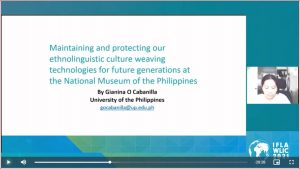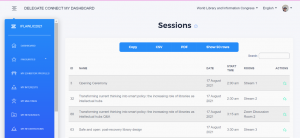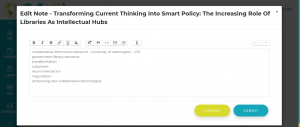General Background: Libraries as innovative and esteemed information producers all over the world have a tremendous impact in the academic and public spheres. In science and technology researchers rely on the librarian’s expertise in organizing, disseminating and archiving their output as a critical element in fostering inclusive participation in the global economy. By comparison, social sciences and humanities research will help reshape the social, economic and political landscape leading to improved service delivery. In Uganda as elsewhere, research output is reliant on the availability of research funding and the constant cultivation of a research culture among academic and research institutions.
Expected role of librarians in the Research Process
Librarians should:
Facilitate the discovery of content and utilization of information resources
Provide expertise on publishing and open access business models
Suggest channels to disseminate research output
Identify trustworthy environments for researchers to publish
Facilitate the development and maintenance of Institutional Repositories (IRs)
Provide training to researchers on resource location, literature review and information literacy
Facilitate scholarly communication and scientific publishing
Implement publisher policies for self-archiving
Facilitate subscription and access to electronic resources
Steps involved in the creation, publication, dissemination, and discovery of scholarly research follow a lifecycle involving several actors, such as researchers, peer reviewers, librarians, publishers, funders, technologists, RECs, and many more in between data collection and knowledge sharing.
[Hansen, 2018]
Science publishing is the gateway to research outcomes. It facilitates results sharing with the academic community and the public, primarily through journal articles and monographs, conference proceedings, working papers, and datasets through libraries.
Librarians’ expertise for evaluation of research impact
The research impact is useful for:
Accountability – to demonstrate to funders the value of their research investment and enhance the chances for further funding.
Understanding – to understand how research leads to impact, and thus ways in which it can be developed to maximize the impact of research findings
Performance evaluation – in developing standards for employment, performance evaluation and promotion of researchers.
Impact evaluation of research output enables the organization to gain an overall understanding of its performance and monitor how its contributions are disseminated to society.
Research impact Assessment
[Research4Life, 2021]
Librarians have a special skill set in Bibliometrics and use other indicators for assessing research impact that uses statistical methods to analyze books, articles, and other publications
Metrics that are used in research assessment include:
Scientometrics – Measures scholarly literature output of science in general, not limited to publications
Webometrics (cyber metrics) – Measures quantitative aspects of the construction and use of information resources, innovative data structures, and technologies on the Web
Informetrics – Measures production, dissemination, and use of all forms of information, regardless of its form or origin
Altimetrics – Measures how datasets are discussed and used around the world – page views/downloads, shares, mentions, bookmarks, applauds, reviews, comments, and reports
A UGANDAN PERSPECTIVE
Libraries in Uganda rely on proactive partners, either national or international:
National:
CUUL, Consortium of Uganda University Libraries
RENU, Research and Education Network for Uganda Free Services catalogue
ULIA, Uganda Library and Information Association
International:
AFLIA, African Library & Information Associations & Institutions
AHILA, Association of Health Information and Libraries in Africa
EIFL, Electronic Information for Libraries
IFLA, International Federation of Library Associations and Institutions
INASP, International Network for the Availability of Scientific Publications
SPIDER, Swedish Programme for ICT in Developing Regions
Let’s take a deeper look at the major two collaborating networks based in Uganda and focused on research promotion:
CUUL – Subscriptions and training, Collaboration and Networking
RENU- Bandwidth (Data), Web hosting, Back up, Research discovery tools, training
There have been very welcome moves by publishers, vendors and others working with libraries to facilitate access to content for researchers even when library buildings were forced to close due to COVID-19 Pandemic.
A key step has been to allow remote access to content that has been restricted to on-site users. For instance, VitalSource has worked with its publisher partners to broaden access to materials using only an email address to log-in, as did ProQuest through eBook Central and Springer through extended log-in periods and Emerald and others through remote access possibilities.
Consortium of Uganda University Libraries (CUUL)
The Consortium of Uganda University Libraries seeks to facilitate effective and efficient collaboration and resource sharing among uuniversity and Institutional libraries in Uganda in order to strengthen the library services provided to their clients. Key objectives include:
Improve the visibility of libraries and mobilize funding for collaboration
Help librarians become part of larger national, regional and international conversations
Researcher Focused Goals of CUUL:
To build the capacity and effectiveness of its member institutions.
Enhances access to quality information for learning, teaching and research; and develops resource sharing procedures
Improve research generation and publication of its member institutions
To advocate for the vital role of libraries in education, research and innovation in Uganda.
Strengthen leadership and membership capability related to advocacy
Build new and strengthen existing partnerships across a range of sectors, so that CUUL can play a vital bridging role in the knowledge economy
In addition, the RENU – CUUL official partnership seeks to:
Facilitate Research & Education collaboration
Research, cooperation and resource sharing
Support Research & Education transformation
Research and Education Network for Uganda Free Services catalogue:
The following resources and services are provided to academics free of charge under the RENU framework:
Institutional data traffic;
IPv4 public addresses + IPv6;
Web conferencing;
Cybersecurity – RENU CERT reports;
SSL Certificates;
Network traffic monitoring;
Open-source mirror;
FileSender;
Eduroam – eduVPN;
Trainings and workshops;
Technicians, researchers and librarians;
Resource Discovery Tools.
In addition, anti-plagiarism tool Turnitin is subsidized through bulk purchase
[RENU, 2019]
[RENU, 2021]
The Availability of Free Research4life Access for Uganda
Created with the initiative of UN under Kofi Anan, Research4Life is a public-private partnership of the FAO, WHO, UNEP, WIPO, ILO, Cornell University, Yale University, the International Association of Scientific, Technical & Medical (STM) Publishers and up to 160 international scientific publishers.
Research4Life was created to reduce the knowledge gap between high-income countries and low and middle-income countries by providing affordable access to important scientific research.
Research4life Project
Since 2002, the five programmes – Research in Health (Hinari), Research in Agriculture (AGORA), Research in the Environment (OARE), Research for Development and Innovation (ARDI), and Research for Global Justice (GOALI) – have provided researchers from more than 10,000 institutions in more than 120 low- and middle-income countries with free or low-cost online access to up to 119,000 leading journals and books in the fields of health, agriculture, environment, applied sciences and law. Further information is available at www.research4life.org
Here below are a few examples of the rich palette of tools that can be subscribed to by Ugandan librarians and information professionals:
Web of Science – the largest citation research engine for acquiring, analyzing, and disseminating global research information;
Scopus – Elsevier’s Scopus , the largest abstract and citation database of peer-reviewed literature;
Publons – Tracks research impact – publications, citation metrics, peer reviews and journal editing work, in one place;
Reference Managers – Mendeley, Zotero, Endnote;
Publisher e-resources Platforms – Wiley, EbscoHost, Emerald, Jstor, Elsevier, IEEE, etc.;
Research data repository registry – re3data.org;
Antiplagiarism tools – Turnitin.
3. CHALLENGES Several challenges can frustrate the library’s noble duty. Below are some typical obstacles for academic libraries across the world:
Budget constraints;
Communication about changes within the library;
Training and career advancement;
Keeping up with changing technical requirements;
Virtual storage space and increased need to attain high internet speeds by expanding bandwidth.
Understanding research trends and the librarian’s role in the research cycle;
Keeping up with policy changes;
Managing and Sharing Research Output;
Countering the rise of predatory publishers;
Conveying the value of librarians to researchers;
Beyond these obvious difficulties, the Consortium of Uganda University Libraries (CUUL) has to address specific challenges:
Expensive subscriptions to publisher e-resources;
High cost of bandwidth for libraries and individuals;
Fluctuating subscription timelines by members;
Researchers need training and online support;
Eifel Funding for Research Repositories ended in 2019;
INASP funding for Library Consortiums ended 2019;
SIDA funding on e-resources and scholarly communication ended in 2020.
Conversely, the future of research in Uganda in our view should entail the following:
Improve budgetary allocation for research generation and dissemination;
Funding long-term sustainability of CUUL and RENU;
Trainings/workshops for researchers and scholars to foster end user engagement;
Collaboration between CUUL, RENU, INASP, RAF and other stakeholders
Connectivity improvement (International bandwidth and content cloud hosting) through RENU
Content development liaison & dissemination of research output with CUUL
Better research & publication with Researchers and Academics Forum (RAF)
Stronger LinkedIn presence and professional networking of Ugandan researchers
Institutional repository development for various institutions with CUUL
Subscription to the Web of Science platform
CONCLUSION
Facilitated by exponential growth of the global ICT sector and the arrival of the 4th Industrial Revolution in 2015, Librarians and Information professionals in Uganda are quite optimistic about their changing roles in facilitating research output. If research is to thrive and gain international visibility, CUUL and RENU need to exploit all the opportunities including creating lasting partnerships that are readily available and forge new ones that can enable Librarians and Information professional access relevant training, collaborative support and alternative funding hence increasing our potential to provide inclusive services based on global standards.
Further reading:
Consortium of Uganda University Libraries: https://cuul.or.ug/index.php/layout/aims-objectives
International Federation of Library Associations and institution: https://www.ifla.org/news/libraries-for-human-rights-good-practices-and-key-trends-in-uganda/
International Network for Scientific Publications: https://www.inasp.info/project/improving-organizational-effectiveness-national-library-consortia
Research4Life: https://www.research4life.org/wpcontent/uploads/2021/06/20210627_M1_L1.3.EN_.Research4Life-1.pptx;
Research4Life:
https://www.research4life.org/wp-content/uploads/2021/06/20210627_M1_L1.2.EN_.Research-Assessment-and-Bibliometrics-1.pptx
Research4Life: https://www.research4life.org/about/programs/
Research and Education Network for Uganda: https://www.renu.ac.ug/services.html
Hansen, Samuel (2018) Supporting Scholarly Communication
https://hacklibraryschool.com/2018/10/31/supporting-scholarly-communication-part-2/
Top 10 Challenges for Academic Libraries in the 21St Century, (2018). http://www.sirsidynix.com/blog/2014/09/25/top-10-challenges-for-academic-libraries-in-the-21st-century.
Andrew Ojulong
Senior Librarian | Ag. UL – Lira University,
PhD Scholar – College of Computing & Information Science, Makerere University
Contact: Mob: +256781308440; Email: [email protected]; Net: www.linkedin.com/in/andrew-ojulong


